By Danielle Karagannis · September 12, 2017

Screenplay by: Emma Donoghue
Based on the novel, Room, by: Emma Donoghue
How could something so traumatic and abhorrent posses such beautiful layers? Room is exactly that, as devastation through the innocence of a child’s perspective is explored.
Room tells the tragic tale of young woman, Ma, who’s been held captive in a tiny shed for seven years. Along the way, she gives birth to a boy, Jack (as a result of her kidnapper’s sick ways). She does everything in her power – while sacrificing her own self and pain – to provide Jack a loving, magical space in an otherwise disturbing reality. Jack is unaware of their world’s truth – Room is all he knows, until eventually breaking free and saved. Life after Room is no less complicated for Ma and Jack, as Ma is faced with her trauma and Jack has to adjust to a new reality.
An unsettling drama that depicts immense grief and loss. At the same time, it also depicts innocence and the power of mind over matter. Whether that’s a good or bad thing, it’s unavoidable in dire situations – sometimes needed to simply to survive.
The story opens and transitions into a tour of Room, revealing the physical set up – cramped, secluded, and run down. This implies Ma and Jack are in some kind of distress. Considering how they are forced to live, though, their “home” is rather warm – thanks to Ma’s love and dedication toward Jack’s happiness.
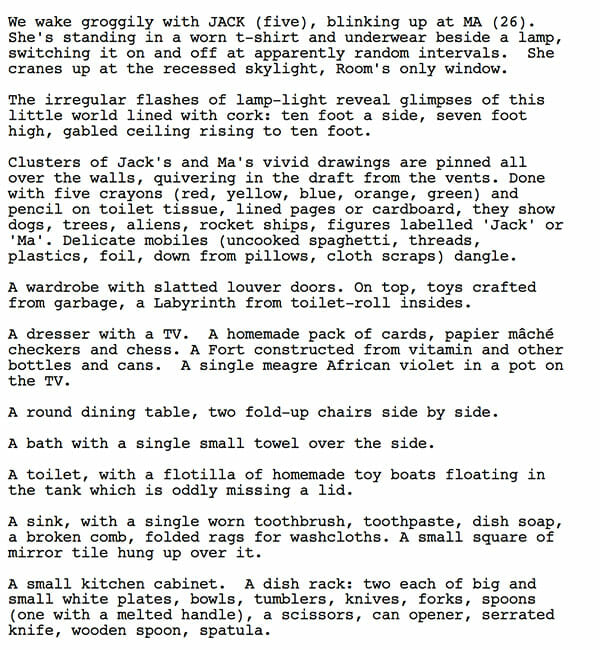 It doesn’t take long to put two-and-two together that Ma and Jack are being held captive, especially due to the last action above, “A grey steel door, no handle. On the wall, a ten-digit keypad with a red light like a watching eye.” Uncomfortably chilling.
It doesn’t take long to put two-and-two together that Ma and Jack are being held captive, especially due to the last action above, “A grey steel door, no handle. On the wall, a ten-digit keypad with a red light like a watching eye.” Uncomfortably chilling.
To note: this opening is done a bit differently in the film itself. The audience is first introduced to Room while a voice over, by Jack, is heard (as him and Ma sleep in bed with ample drawings pinned to their cold, prison like walls).
 And then, the entire room of Room is shown (similar to the first script excerpt) after Jack wakes up, beginning his morning ritual – saying hi to his “friends.”
And then, the entire room of Room is shown (similar to the first script excerpt) after Jack wakes up, beginning his morning ritual – saying hi to his “friends.”
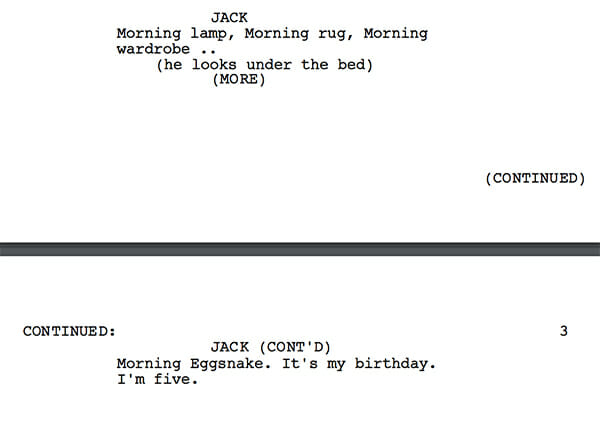 While in the script, Room is introduced, followed by Jack’s voice over. And, him saying hello to his “friends” isn’t utilized as a way to also reveal Room’s space.
While in the script, Room is introduced, followed by Jack’s voice over. And, him saying hello to his “friends” isn’t utilized as a way to also reveal Room’s space.
Room centers on two primary individuals: Ma and Jack.
Ma, a young female in her twenties, emotionally spent due to her unspeakable experience after kidnapped, locked away, and controlled for seven years. Jack, introduced on his fifth birthday, is quite the opposite: full of imagination and naivety.
A scene early on exhibits Ma and Jack’s personality traits, while also introducing their kidnapper, Old Nick.
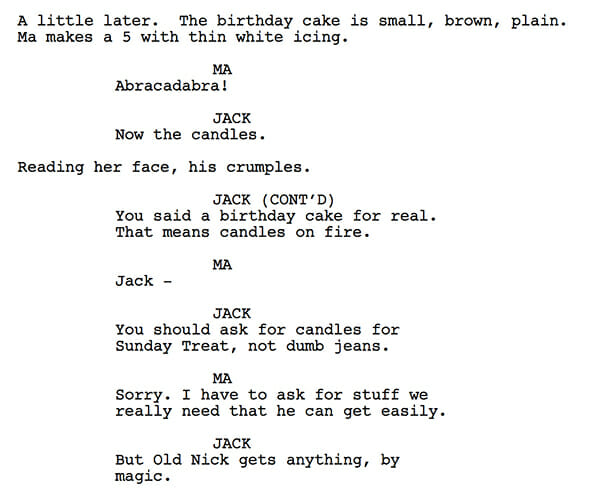 A cross between Ma’s undeniable strength and Jack’s purity, as Ma takes the hit in order to protect him. Through this, Old Nick manages to appear as the “good” guy (to whatever extent), providing them “treats” on Sunday (in actuality, limited resources Ma and Jack need to maintain basic survival) and that he bears some kind of “magic.”
A cross between Ma’s undeniable strength and Jack’s purity, as Ma takes the hit in order to protect him. Through this, Old Nick manages to appear as the “good” guy (to whatever extent), providing them “treats” on Sunday (in actuality, limited resources Ma and Jack need to maintain basic survival) and that he bears some kind of “magic.”
Even more disturbing is soon after: Old Nick’s physically introduction. Every Sunday, right before this happens, Ma puts Jack to bed in an enclosed wardrobe because: 1. She never wants Jack and Old Nick to meet and 2. She doesn’t want Jack to see what actually happens outside of his “safe house”, Wardrobe.
This week, All Ma asked of Old Nick was a pair of jeans for Jack and grapes. She got the jeans, but instead of grapes: canned pears, as Old Nick states, “The grapes were way too much…” Much is shown of Old Nick’s heartless ways through this meeting:

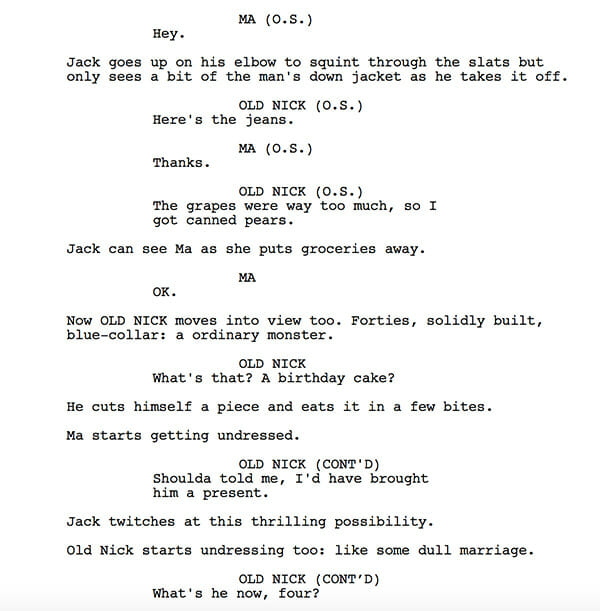
It’s enraging to witness how Old Nick has no comprehension of what he’s putting Ma and Jack though (this is an obvious). But, the line that’s especially striking is the fact that he can’t bother to know Jack’s age AKA how many years ago he impregnated Ma through raping her. This goes to show how little his monstrous ways actually affect him, as he destructs another human’s life.
This is not only done through portraying the physical world of Room (refer to example under “Establishing tone and/or genre”), but also via witnessing Ma and Jack’s day-to-day life within – attempting to participate in things that people tend to take for granted in the outside world.
Friends: 
![]()

Exercise:

Brushing ones teeth:

Entertainment:
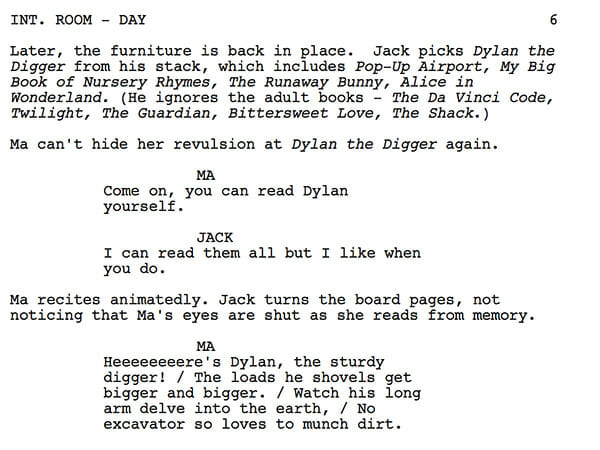
Maintaining health:

There are a handful of themes Room exhibits (fear, seclusion, freedom), but one less addressed that’s pertinent to Room is trauma and its lasting effects.
To be kidnapped at age seventeen (or any age for that matter) – your life stolen due to the sick selfishness of another.
To be born and raised inside a secluded space, only knowing and have met one other person, thinking everything outside of this space isn’t real…. To eventually discover otherwise.
The first ten pages set all of this up, unveiling several of the many traumas they have endured: rape (Ma), giving birth alone with no medical attention (Ma), and being held captive (Ma and Jack).
As if that’s not enough, beyond page ten it’s learned Ma was kidnapped and she also endures physical abuse from Old Nick. There’s also a constant fear for Ma that resources will be cut (food, electricity, health needs, etc). Then for Jack, the only world he knew turned out to be a lie. Let alone the trauma of adapting to the real world and having to deal with what happened to them, once escaped and rescued.
Ma and Jack’s time in Room is set up for the catalyst: Jack’s escape. This catalyst transitions the audience into witnessing the meat of the story – Ma and Jack adjusting to life outside of Room.
All that’s needed in the first ten pages is set up. It’s vital that the audience is brought into Ma and Jack’s realm, so it’s understood what’s at stake once the catalyst happens. This set up stands out compared to many other films that depend on flashbacks. Not that flashbacks are bad, it’s just more commonly used. Instead, Room’s audience is brought into the tragic space that catapults both Ma and Jack’s progression.
 Danielle Karagannis is a writer/director. She currently has a feature script entitled INSOMNIA (ensemble comedy) that’s been accepted into filmmaker labs and is taking her to the 2018 Berlinale / EFM. You can watch Danielle‘s latest film, GIRL (short), here: http://www.daniellekaragannis.
Danielle Karagannis is a writer/director. She currently has a feature script entitled INSOMNIA (ensemble comedy) that’s been accepted into filmmaker labs and is taking her to the 2018 Berlinale / EFM. You can watch Danielle‘s latest film, GIRL (short), here: http://www.daniellekaragannis.
For all the latest from The Script Lab, be sure to follow us on Twitter, Facebook, and Instagram.